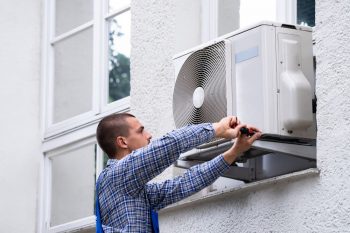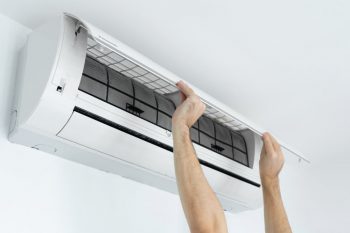
Are you struggling to get a good night’s sleep because of the noise from your air conditioner? If so, you’re not alone.
The loud noises of air conditioners can be extremely disruptive, making it difficult to relax or enjoy time at home. But don’t worry; there are ways to block air conditioner noise and create a more peaceful indoor environment.
This comprehensive guide will discuss everything you need to know about blocking or reducing air conditioner noise, from understanding the source of the problem to using effective soundproofing techniques.
Here’s a quick recap of the tips from this article:
- First, use a soundproof blanket or cover to block the noise immediately.
- Second, replace worn-out air conditioners parts, such as fan blades, motor bearings, and fan belts.
- Third, cleaning the air filter and condenser coils will help keep the system running more quietly.
- Fourth, if your AC unit is over ten years old, invest in a new one rated for low noise levels.
- Finally, consult with a professional HVAC technician for expert advice and guidance.
Whether you are a homeowner or a renter, this guide will help you reclaim your quiet home and enjoy a peaceful environment.
Why Is Your AC Making Noise?
Before attempting to block air conditioner noise, it’s important to understand what’s causing the problem in the first place. So let’s take a closer look at the types of noises an AC unit can make and the factors contributing to it.
Types of AC Noises and Factors Contributing to It

- Hissing Noise: A hissing noise can indicate a leak in the AC system, which could result in a loss of refrigerant. Factors contributing to this noise could be a crack in the AC unit, a faulty refrigerant line, or a damaged O-ring seal.
- Banging or Popping Noise: A banging or popping noise could indicate a problem with the ductwork or that a component in the AC unit has become loose. It could be due to a poorly installed duct system, loose screws or brackets, or a damaged fan blade.
- Grinding Noise: A grinding noise could indicate a problem with the AC’s motor or fan. Several factors can contribute to it, including; a worn or damaged bearing or an issue with the fan blade.
- Humming Noise: A humming noise is often normal for an AC unit and is usually caused by the vibration of the fan or the compressor. However, if the humming noise becomes louder or more persistent, it could indicate a problem with the fan motor, refrigerant levels, or defective relay switch.
- Squealing Noise: A squealing noise from an AC unit could indicate a problem with the fan belt or the bearings in the fan motor.
- Rattling Noise: A rattling noise could be caused by loose parts inside the AC unit, such as screws, brackets, or panels. It could also be due to a clogged air filter or a problem with the ductwork.
- Buzzing Noise: A buzzing noise from an AC unit can indicate a problem with the fan motor, the condenser coils, or the AC’s wiring.
- Clicking Noise: A clicking noise from an AC unit could indicate a problem with a thermostat, a loose component in the unit, or an issue with the electrical components, such as a faulty relay switch. It could also be due to the AC unit cycling on and off, which is normal, but if the clicking noise becomes persistent, it could indicate a problem.
To determine the noise level your air conditioner produce, you can use a simple decibel meter or a smartphone app designed for this purpose.
Place the meter or smartphone near the AC unit and turn it “ON.”
The meter will display a decibel reading indicating the noise level being produced. A typical conversation is around 60 decibels, so use this as a reference point to determine if your air conditioner is producing an unacceptable noise level.
Tips for Cutting Down Your Air Conditioner’s Noise Level
Now that you understand the different types of noises an AC unit can make and the factors contributing to them. Let’s look at some of the most effective soundproofing techniques for reducing noise levels.
1. Use a Soundproof Cover or Blanket
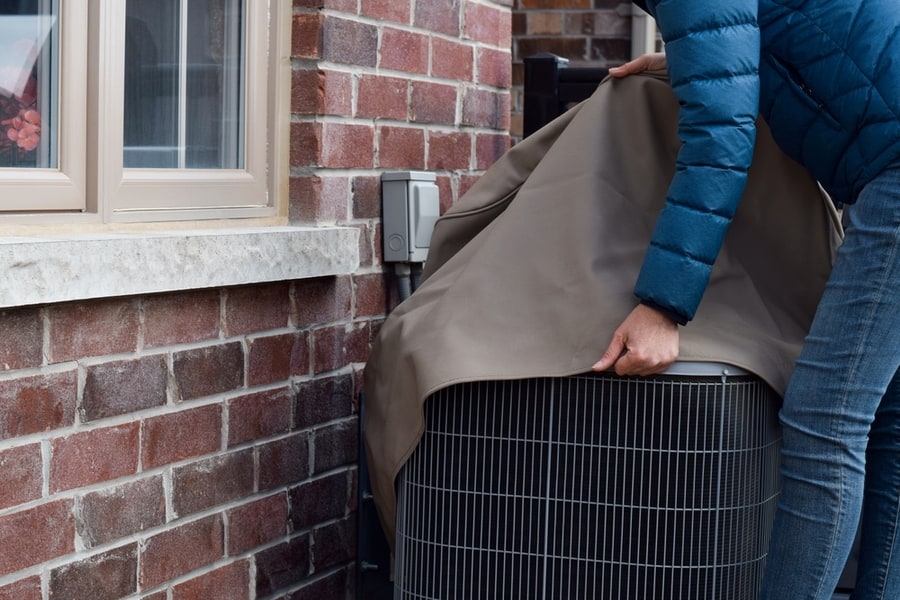
One of the easiest and most cost-effective ways to reduce air conditioner noise is using a soundproof cover or blanket for the unit.
These covers are designed to insulate and reduce noise transmission from the unit, making them ideal for blocking air conditioner noise.
How To Use?
Wrap the cover around the unit and secure it with Velcro straps or other fastening methods.
2. Install Soundproofing Materials Around the AC Unit
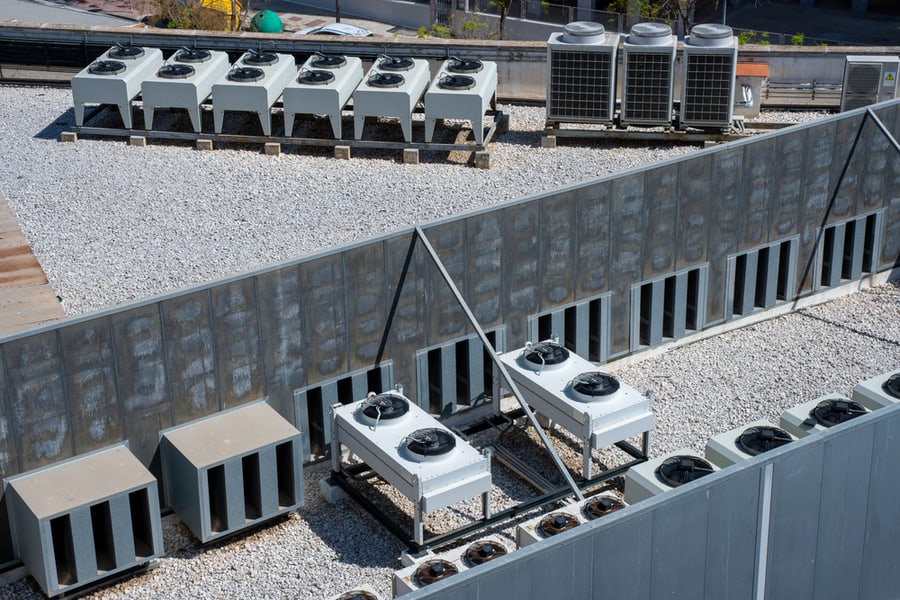
Another option is to install soundproofing materials around the AC unit. This can be in the form of soundproof form panels, acoustic tiles, or mass-loaded vinyl.
These materials work by absorbing and blocking sound, effectively reducing the noise transmitted from the AC unit to the rest of the house.
Add as much soundproofing as possible to the walls and the room’s ceiling for the best results.
3. Choose the AC Location Carefully
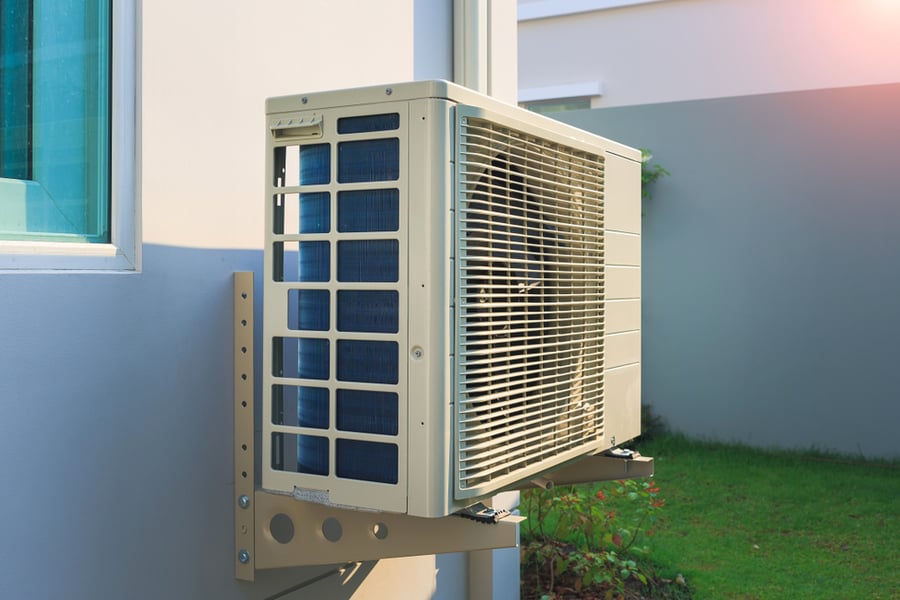
The location of your AC unit can also impact the amount of noise produced. Placing the unit in a corner or isolated from the living areas will help absorb and diffuse some noise.
Placing the unit away from windows and doors can also help reduce the noise transmitted to the rest of the home.
Additionally, installing the unit on a solid, level surface and using anti-vibration pads can help reduce vibrations and minimize noise.
By carefully choosing the location of the AC unit and making a few simple modifications, you can significantly reduce the amount of noise produced and enjoy a more peaceful home environment.
4. Install a Fence
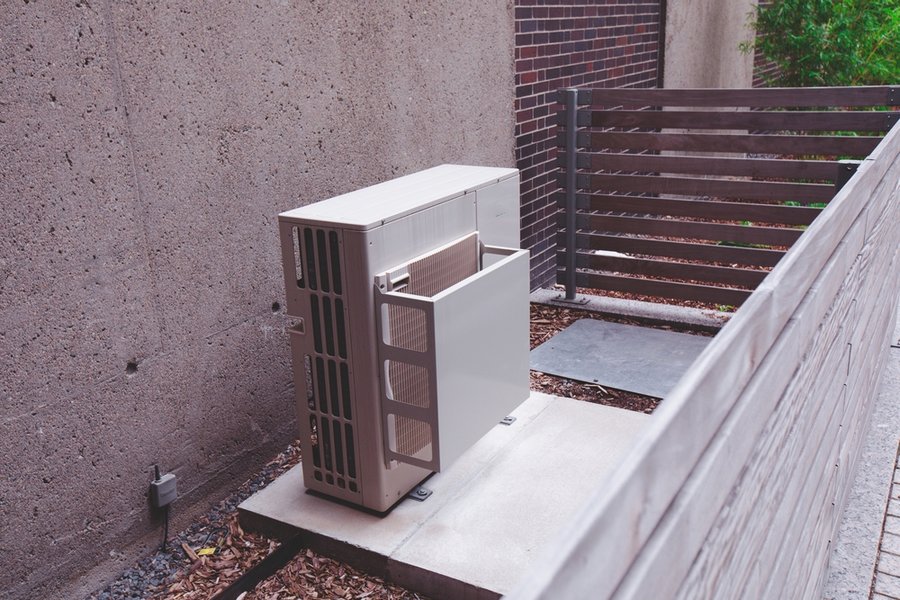
Installing a fence around the AC unit can also be an efficient way to reduce noise transmission. A wooden or vinyl fence can help absorb and diffuse some of the sound produced by the unit, preventing it from reaching other areas of the home.
When installing a fence, place it close to the unit and ensure it’s tall enough to enclose it fully. This will help block the maximum amount of sound and create a more peaceful environment in your home.
keep in mind that the performance of the AC unit can be inhibited if a fence restricts airflow. Ensure enough space between the AC unit and the fence for optimal performance.
5. Install a Soundproof Ductwork
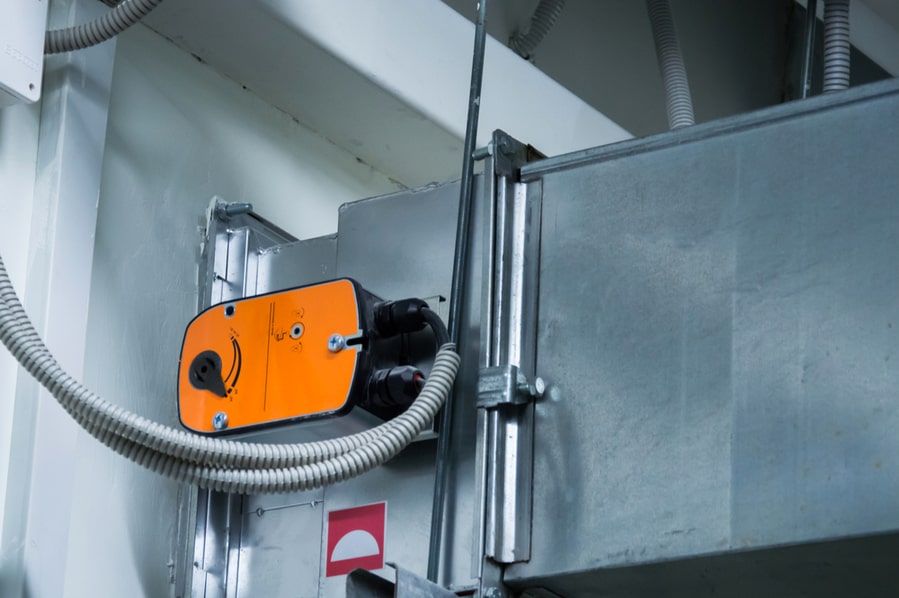
You can also reduce the air conditioner noise by installing soundproof ductwork. This involves wrapping the ductwork with insulation and soundproof materials to prevent noise from traveling through your home ducts.
This can be an efficient way to reduce overall AC noise and keep your home environment more peaceful.
Hire a professional HVAC technician to assist you with installing soundproof ductwork to ensure it’s done correctly.
6. Use Soundproof Curtains and Window Treatments
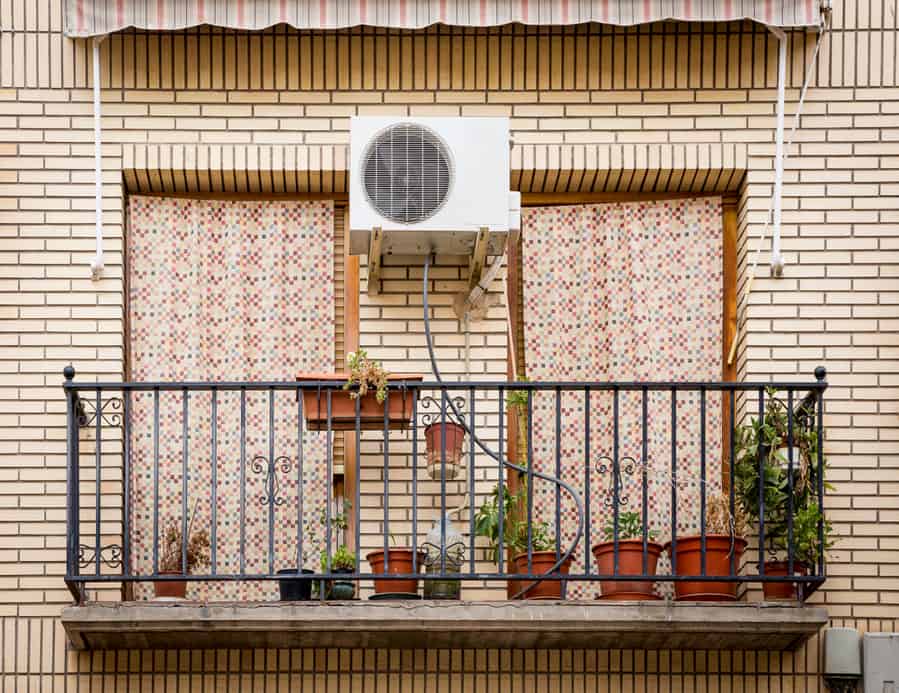
Soundproof curtains and window treatments can also reduce the amount of noise transmitted from the AC unit.
Look for heavy-duty curtains or window treatments specifically designed for soundproofing and hang them over the windows closest to the AC unit.
This will help block the noise before it can enter the room. Additionally, consider adding soundproof blinds or shades to reduce the amount of noise entering the rooms.
7. Replace Worn Out Parts
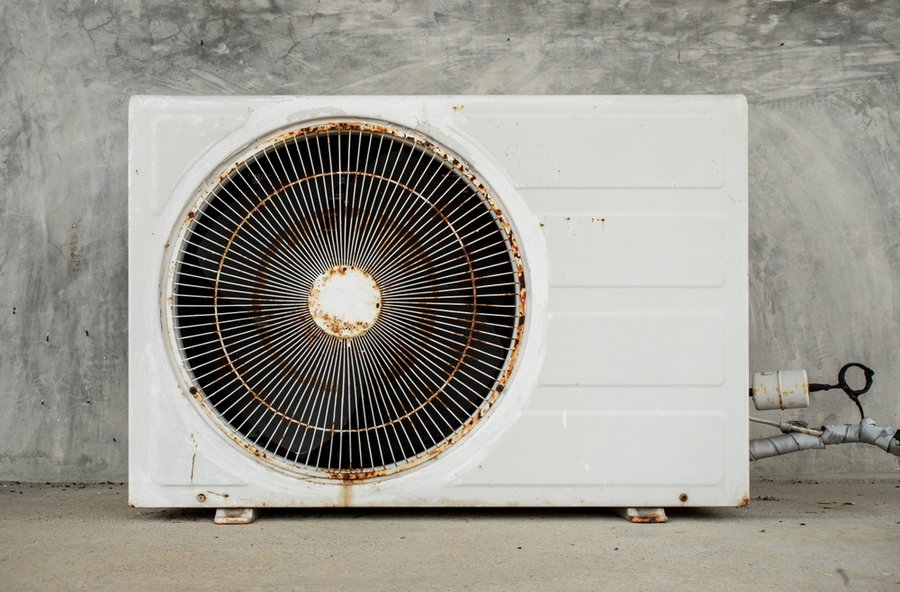
Replacing worn-out parts of the air conditioner can also help reduce the amount of noise it produces. Common parts that may wear out over time and contribute to noise include; the fan blades, motor bearings, and fan belts.
If these parts are worn or damaged, they can cause increased vibrations and noise levels. By replacing them, you can improve the performance of your air conditioner and reduce the amount of noise it produces.
8. Regular Schedule Maintenance
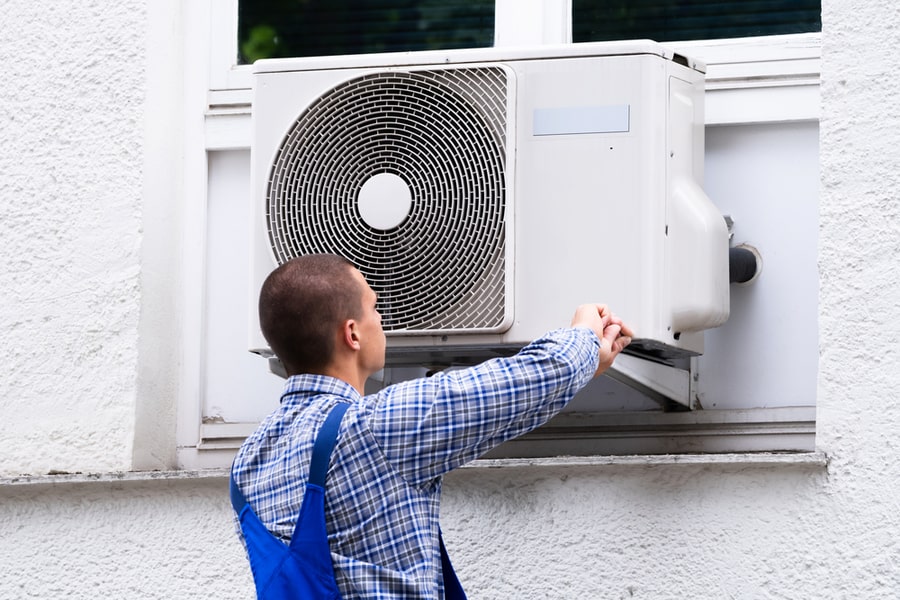
scheduling regular maintenance is also an effective way to reduce air conditioner noise. Regular maintenance can help ensure that your AC unit runs smoothly and that all its parts are securely in place.
This help reduces rattling noises and vibrations, making your AC unit much quieter.
Additionally, regular maintenance can help to identify potential issues with your AC unit before they become major problems.
You can help prevent noise from becoming a problem by fixing these issues before they get worse.
Regularly maintaining your AC unit, such as cleaning the coils and replacing clogged filters, can also help prolong the unit’s life.
9. Invest in a New AC Unit
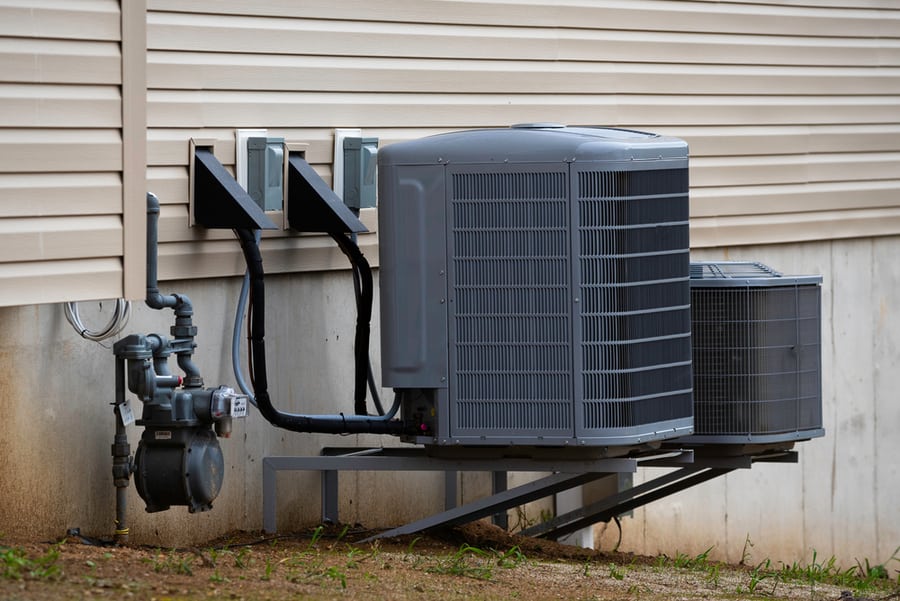
Investing in a new AC could solve your noise problem if all else fails. Modern AC units are designed to be much quieter than older models.
When shopping for a new AC unit, consider factors such as size, type, and energy efficiency to ensure you get the best unit for your needs.
Additionally, consider purchasing an AC unit rated for low noise levels. Some manufacturers even offer units with specialized noise-reduction features, such as silent fans and insulated compressors, that can significantly reduce the amount of noise produced by the unit.
Look for AC units with high SEER (Seasonal Energy Efficiency Ratio) ratings, as these are often more energy efficient and produce less noise.
Do Noise Cancelling Devices Help To Reduce AC Noise?
Yes, noise-canceling devices can help reduce the noise an air conditioner produces. Several noise-canceling devices are available such as white noise machines.
These devices work by absorbing or masking the sound produced by the AC unit, reducing the amount of noise transmitted to the rest of the house.
Some of these devices can even help to reduce vibrations, further reducing the overall noise produced by the AC unit.
However, it’s important to remember that noise-canceling devices are better suited to reducing specific types of noise. So be sure to choose a device designed to block the type of noise your AC unit produces effectively.
When shopping for noise-canceling devices, always check the Sound Transmission Class (STC) rating, as this will indicate how well the product can block noise.
Conclusion
Blocking air conditioner noise can be challenging, but with the right techniques, you can reduce the noise your AC unit produces and enjoy a more peaceful indoor environment.
Whether using soundproofing materials, increasing the distance between the unit and the occupied space, or investing in a new AC unit, the key is finding the best method for you and your home.
For optimal results, it’s always best to consult a professional HVAC technician before attempting these noise reduction methods. With the right advice and guidance, you can achieve a quieter home environment and enjoy peaceful days and nights.
Frequently Asked Questions
Should I Turn Off My AC if It Is Making Noise?
If your AC makes unusual noises, it’s recommended to turn it off and inspect it. Continuing to operate a noisy AC unit can lead to further damage and potentially increase the cost of repairs.
In some cases, the noise could be a sign of a safety issue, such as a refringent leak or an electrical problem, and it’s important to have it checked as soon as possible to prevent further damage or potential safety hazards.







